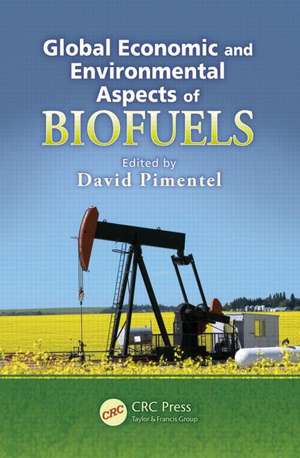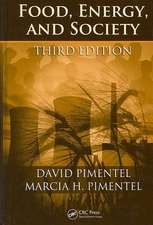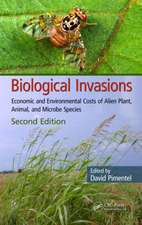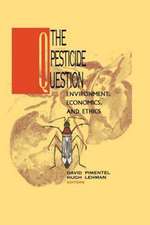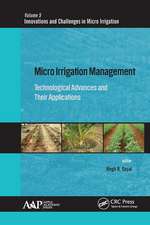Global Economic and Environmental Aspects of Biofuels
Editat de David Pimentelen Limba Engleză Hardback – 2 apr 2012
Key Features
- Discusses biofuels within the context of the world population problem, food, malnutrition, resource depletion, and climate change
- Asks the critical question whether the production of ethanol from corn, sugar cane, crop residues, and other organic materials has proven too costly in both economic and environmental terms
- Analyzes the uses and interdependencies among land, water, and fossil energy resources in food versus biofuel production
- Includes case studies on the economic and environmental impacts of biofuel production and use from the United States, Europe, Brazil, and tropical environments
- Explores the future production of biodiesel and ethanol from salt-water algae and tropical palms, while recognizing the technological problems that must be resolved in processing these materials
| Toate formatele și edițiile | Preț | Express |
|---|---|---|
| Paperback (1) | 461.03 lei 6-8 săpt. | |
| CRC Press – 18 sep 2018 | 461.03 lei 6-8 săpt. | |
| Hardback (1) | 1338.06 lei 6-8 săpt. | |
| CRC Press – 2 apr 2012 | 1338.06 lei 6-8 săpt. |
Preț: 1338.06 lei
Preț vechi: 1631.77 lei
-18% Nou
Puncte Express: 2007
Preț estimativ în valută:
256.03€ • 267.32$ • 211.90£
256.03€ • 267.32$ • 211.90£
Carte tipărită la comandă
Livrare economică 04-18 aprilie
Preluare comenzi: 021 569.72.76
Specificații
ISBN-13: 9781439834633
ISBN-10: 1439834636
Pagini: 453
Ilustrații: 71 b/w images and 77 tables
Dimensiuni: 156 x 234 x 25 mm
Greutate: 0.77 kg
Ediția:1
Editura: CRC Press
Colecția CRC Press
ISBN-10: 1439834636
Pagini: 453
Ilustrații: 71 b/w images and 77 tables
Dimensiuni: 156 x 234 x 25 mm
Greutate: 0.77 kg
Ediția:1
Editura: CRC Press
Colecția CRC Press
Public țintă
Ecologists, agronomists, plant scientists, agricultural engineers, energy engineers, economists, environmental scientists, environmental chemists, weed scientists, biotechnologists, and social scientists.Cuprins
Biofuels cause malnutrition in the world. Biofuel and the world population problem. Energy cropping in marginal land: Viable option or fairy tale? Can switchgrass deliver the ethanol needed to power U.S. transportation? Biofuels, climate change, and human population. Uncertain prospects for sustainable energy in the United Kingdom. Net energy balance and carbon footprint of biofuel from corn and sugarcane. Water, food, and biofuels. The potential of Onondaga County to feed its own population and that of Syracuse, New York: Past, present, and future. Energy production from corn, cellulosic, and algae biomass. Biofuels and world food and society issues. The potential of algae and jatropha as biofuel sources. Crop residues for biofuel and increased soil erosion hazards. Biofuels, foods, livestock, and the environment.
Notă biografică
David Pimentel, Ph.D., is Professor of Ecology of Agricultural Sciences in the Department of Entomology and Department of Ecology and Evolutionary Biology, College of Agriculture and Life Sciences, Cornell University. His research and consulting accomplishments cut across many disciplines. Dr. Pimentel has served on Presidential Commissions and National Academy of Sciences’ Boards and Committees. He has authored nearly 700 scientific publications, written three books, and edited 34 books.
Recenzii
"Interest in biofuels is mostly driven by their relative carbon neutrality and adaptability to the existing infrastructure, particularly in the transportation sector. The gradual increase in mixing ethanol with gasoline has raised questions about biofuels, especially those produced from crops and food stocks. This book discusses several of these issues, including resulting food shortages, water use, and land erosion, questioning the efficacy of biofuels as a replacement for fossil fuels both economically and environmentally. Using case studies of several industrial countries, the book explores the limits of biofuels in filling current and future energy demands given population growth and improved living standards in developing countries. … Summing Up: Recommended. Lower-division undergraduates and above."
—J. Tavakoli, Lafayette College, CHOICE, Vol. 50 No. 08, April 2013
—J. Tavakoli, Lafayette College, CHOICE, Vol. 50 No. 08, April 2013
Descriere
This reference discusses biofuels within the context of problems associated with the world population, food production, and malnutrition. It analyzes the uses and interdependencies among land, water, and fossil energy resources in food versus biofuel production. It also looks at the environmental problems associated with these issues, as well as the implications of food shortages and serious destruction of vital soil resources. The book is enhanced with case studies from the United States, Europe, Brazil, and tropical environments that demonstrate the economic and environmental impacts of biofuel production and use.
